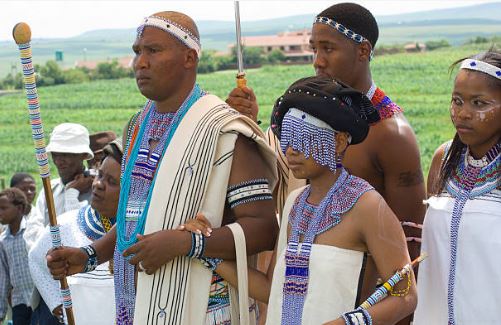Lifestyle
All you need to know about the Xhosa traditional marriage

Marriage is something that is highly valued in the Xhosa culture.
When a woman gets married the entire community rejoices with her and her family as marriage is seen as a blessing from God.
These are the steps taken when planning for a Xhosa traditional wedding:
Ukuthwala (choosing the one)
Although nowadays this term is associated with kidnapping young girls and forcing them into marriages, Ukuthwala is a “legal bridal abduction” that has been practiced for decades .
It’s a marriage custom within the Xhosa culture where the groom-to-be chooses a lady he is interested in marrying.
He then informs his family and they visit the chosen bride’s family to discuss their desires and both the families reach an agreement.
According to Matrimony, the bride-to-be is immediately taken by the groom’s family and required to spend the night with them. This is a traditional method of signifying the intention to marry and the bride is welcome to return to her family the following morning and then the betrothal process begins.
Lobola (“bridal price”)
The lobola process is when the groom-to-be along with his family pay a certain amount of money to the bride’s family in order to obtain the right to marry their daughter.
Traditionally lobola is amounted to about 6 cattle – depending on the bride’s family’s request. However, things have changed and some families prefer to be paid in cash.
The price is usually based on the bride’s academic achievements and success: the more educated she is, the higher the price, and also if she is still a virgin the groom is expected to pay quite a lot.
What most people don’t know is that the lobola money is used for the wedding celebrations and other traditional ceremonies that might take place during that period such as the exchanging of gifts.
Once the lobola is finalised the marriage can take place. The families appoint a day for the wedding and a small traditional celebration takes place prior to that. Animals are slaughtered as a sacrifice to the ancestors, inviting them to bless the occasion and to introduce the bride to them.
There are no formal invitations for this event, but anyone is welcome and it often leads to large crowds.
The wedding
Just like with most weddings the bride and groom are not allowed to see each other the day before the wedding.
The wedding celebrations continue for at least two days and the entire event is usually very joyous, includes lots of dancing, singing and features a lot of umqombothi (traditional beer).
At the end of the day the bride and groom walk along the main road together to show the community that they are now officially husband and wife.
When it comes to modern, urban weddings most couples prefer to have both the traditional and modern wedding, which consists of a church service and reception.
Nowadays, however, the bride and groom are far more familiar with each other before the marriage process begins. And ukuthwala is no longer as common – instead a formal marriage proposal takes place and only if accepted the lobola negotiations will take place.










